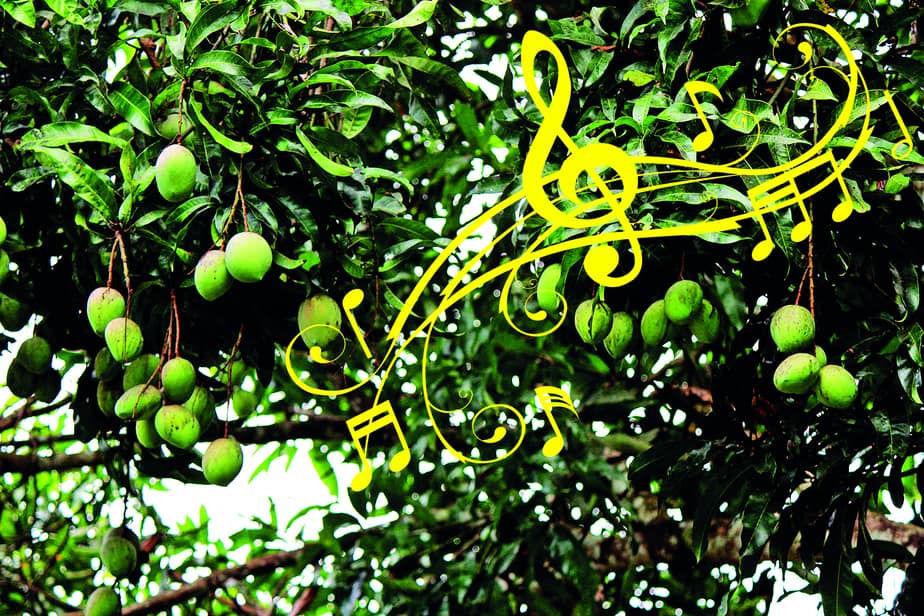In literature and on screen, mangoes often inspire lyrical thoughts. However, there isn’t a rich enough repertoire to match the fruit’s popularity
As mangoes are on their way to hit the summer fruits market, there is obviously more to the fruit than the clichéd Alphonso features. One may also be sceptical about the sense of the festivals the fruit inspires in the metro cities. While mango expertise and conversations are a matter of everyone’s claim in large parts of non-metro India, its representation in country’s literature and popular culture is considerable, if not overwhelming.
It surely isn’t always as tangential as its metaphorical use in the titles of two different works of fiction published in last two decades in the subcontinent. David Davidar ‘s quite unmango-like novel The House of Blue Mangoes (2002) was followed by violent imagery in Pakistani writer Mohammad Hanif ‘s work A Case of Exploding Mangoes (2008).
Meanwhile, in the advertising space, you saw the sensuality of Katrina Kaif’s “aam sutra” lascivious lips as she promoted a mango-flavoured soft drink brand.
Interestingly, the association of mangoes with romantic love and sensuality is nothing new for India. Some ancient Indian texts mention the belief among people that a mango tree represented Prajapati and its leaves and flowers were believed to be darts of Kamdev. Apart from the amorous appeal of mangoes, the Bradaranyaka Upanishad also extolled the qualities of the mango and a few scholars are of the opinion that the fruit referred to as saha in Rig Veda alludes to the mango.
More than the fruit, it was the tree and soothing (and sometimes amorous too) ambience of mango orchards or groves (whatever you call it) which captivated the poetic aesthetics in a wide variety of Indian literary texts. Just sample this verse from a Sanskrit text:
In his Ritusambharam, Kalidas vividly describes the joyful presence of a cuckoo in a mango orchard. which could be paraphrased to this effect Centuries later, Amir Khusrau noted how mango buds contribute to the infectious ambience and inspires a damsel to try on her make up:
Akal ban phool rahi /ambva phootey, tesu phule/koel boley dar dar/gori karat shingar
(The mustard blooms in every field/Mango buds snap open, the flower blooms/The cuckoo sings from every branch/The damsel does her make-up.)
In the realm of popular culture now, as seen through the prism of Hindi film music, there have been very few references to the mango tree or orchard. The few that are there carry romantic tinge and sometimes also the glow of memories – sometimes tormenting, sometimes nostalgic and sometimes aesthetically evocative. One of the most melancholic evocations of memories of a mango tree in Hindi films was as early as in early sixties.
In Saranga (1961) Mukesh hummed a number which he himself considered one of his more memorable songs. Saaranga Teri Yaad Me, sung for the forlorn lover and enacted by Sudesh Kumar, recalled the swaying or swinging of a mango tree in the lines penned by Bharat Vyas and put to music by Sardar Malik.
Wo amwaa ka jhoolnaa/Wo peepal ki chhaanv/Ghoonghat mein jab chaand tha/ Mehandi lagi thi paanv/Aaj ujadke rah gayaa/wo sapnon kaa gaao/O Saranga teri yaad mein nain huye bechain ho madhur tumhaare milan bina/Din katate nahin rain
(That swing of the mango tree/That shade of the peepal tree/When the moon was behind the face veil/And mehendi was on the feet/Today that village of dreams lies deserted/Saranga, eyes go restless in your memory/Without those meetings, neither the days nor the nights pass).
In 1976, a song in Basu Chatterjee’s Chitchor expresses the yearning of a young lover to have more meetings with his beloved at their first rendezvous – under a mango tree. Written and composed by Ravindra Jain, this Yesudas and Hemlata duet had Amol Palekar and Zareena Wahab emoting on the screen:
Jahan pahli baar mile the ham/jis jagah se sang chale the hum/nadiya ke kinaare aaj usi /amwa ke tale aana/Jab deep dale aana/jab shaam dhale aana (Where we met first/From where we walked together/Do come to that river bank/ Come under that mango tree only/Come when lamps are lit/Come when the evening fades away).
It is interesting to note that of late, it was the year 2001 which had two films with songs which referred to mango groves (Zubeidaa – Pyara Sa Gaon song) and the charm of the ripening of mangoes in a rural milieu (Gadar – Udja Kale Kawan song).
But mango orchards in the Indian hinterland aren’t only about nostalgia, idyllic pace, love, natural aesthetics and the savouring of nature’s delights. They are also brutal arenas in which horrific feudal relations play out. Just sample how simply Hindi poet and novelist Nagarjun portrayed the dehumanised face of a mango grove in the first few lines of his 1952 path-breaking novel, Balchanwa.
A child recalls how his father’s trespassing into a mango grove to savour two kishenbhogs (a variety of mango found in North Bihar) turned into a crime that was punished by him being lynched to death by the feudal owner of the orchard. The boy traces the incident to 1936 and the district is Darbhanga, and he recalls:
Barah baras ki umra me mera baap mar gaya…Suna hai, mera baap dophar se samay bag se do kishenbhog tor laya tha. Kishenbhog kacha bhi khane me khoob swadisht hota hai.thik waisa hi jaisa bhigoya hua chawal.todte to kisi ne dekha nahi par baithe-baithe wah aam soh raha tha to kissi ne dekha aur…chugli kar di, phir kya tha…(When I was 12, my father passed away. I have been told that my father had taken two kishenbhogs from the orchard. Kishenbhog, even if not ripe, is very tasty, just like soaked rice. Nobody had seen him doing so but when he was savouring the mangoes, somebody saw and told the feudal owner, and then what was left?).
As much one wishes more mango tales were written, songs sung and screened, no one wishes the great fruit such brutal associations and stories to tell. One, obviously, also dreads the Alphonso doing all the talking for the fruit too.




